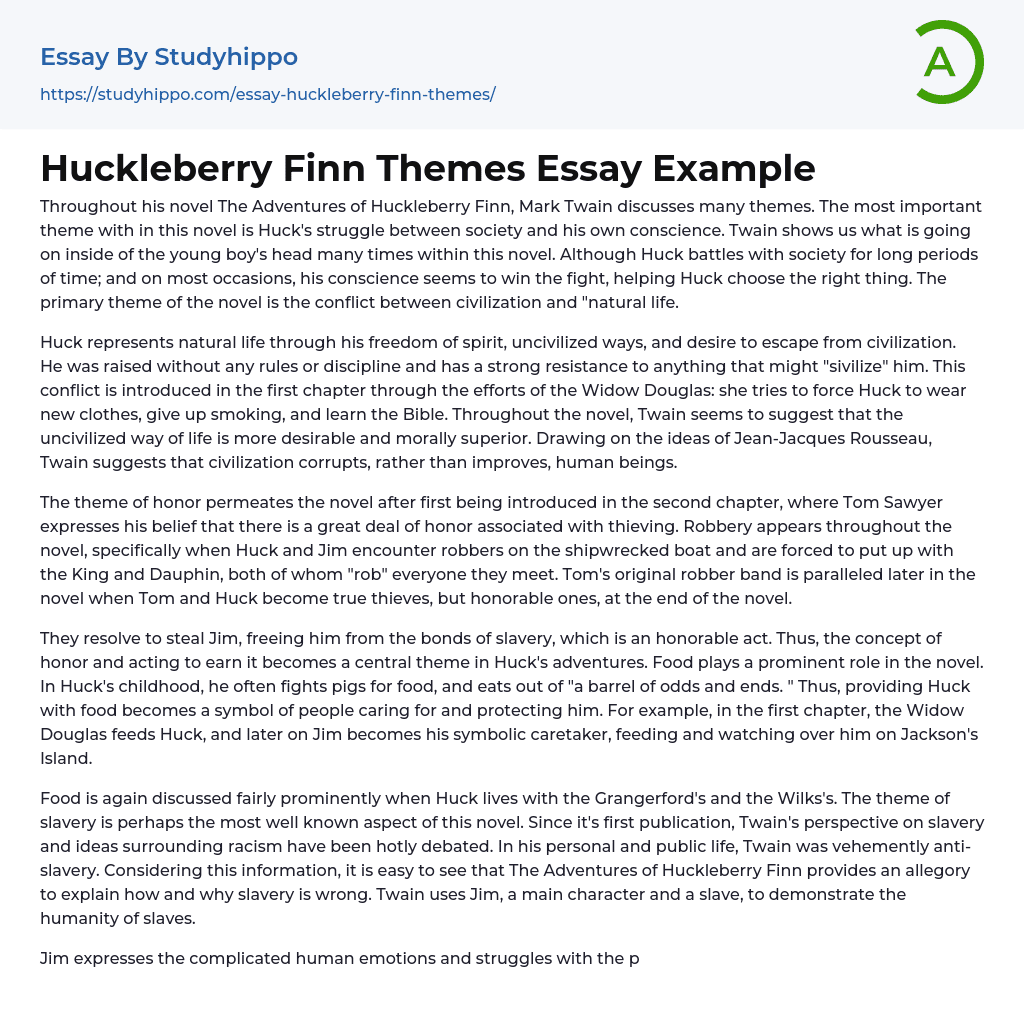In his novel The Adventures of Huckleberry Finn, Mark Twain addresses several themes, with the most significant being Huck's internal struggle between societal norms and his own moral compass. Twain frequently delves into the thoughts and dilemmas plaguing the young protagonist. Despite facing extended periods of tension with society, Huck's conscience usually triumphs, guiding him towards making the correct decisions. The central theme of the book revolves around the clash between civilization and the state of nature.
Huck embodies the essence of natural life, characterized by his free-spiritedness, untamed behavior, and aspiration to escape the confines of civilization. Growing up without any constraints or structure, he strongly resists any attempts to civilize him. The first chapter unveils this conflict as the Widow Douglas endeavors to make him conform by changing his
...attire, abandon his smoking habit, and acquire knowledge of the Bible. Throughout the narrative, Twain insinuates that living an uncivilized life is more attractive and morally superior. Drawing inspiration from Jean-Jacques Rousseau's philosophies, Twain posits that civilization corrupts rather than enhances human beings.
The novel revolves around the theme of honor, which is first introduced in the second chapter when Tom Sawyer asserts that there is a sense of honor in thieving. Throughout the story, instances of robbery arise. For example, Huck and Jim come across robbers on a shipwrecked boat and are coerced into tolerating the King and Dauphin, who deceitfully take from everyone they encounter. Later in the novel, Tom and Huck imitate Tom's original group of robbers, but adopt a more honorable approach in the end.
The main theme of honor and taking action to ear
it is central to Huck's adventures, particularly when he resolves to steal Jim and free him from slavery. Food also plays a prominent symbolic role in the novel. During Huck's childhood, he often fights pigs for food and eats from "a barrel of odds and ends." Therefore, providing Huck with food symbolizes people caring for and protecting him. The Widow Douglas feeds Huck in the first chapter, and later on, Jim becomes his symbolic caretaker, feeding and watching over him on Jackson's Island.
Food is again a significant topic when Huck stays with the Grangerford's and the Wilks's. The theme of slavery is widely known in this novel and has sparked intense debates regarding Twain's perspective on slavery and ideas around racism. Twain was strongly against slavery both in his personal and public life. With this knowledge, it becomes clear that The Adventures of Huckleberry Finn serves as an allegory to illustrate the wrongness of slavery. Twain utilizes Jim, a prominent character and a slave, to showcase the humanity of enslaved individuals.
Jim portrays complex human emotions and struggles with his life's path. He flees from Miss Watson, his owner, to avoid being sold and separated from his family. Jim endeavors to gain freedom to purchase his family's liberation. Throughout their journey on the river, Jim looks after and safeguards Huck as a friend rather than a servant. Twain's intention is to evoke sympathy and empathy towards Jim while displaying outrage at the society that has enslaved and endangered him. Despite using Jim's character to criticize slavery, Twain never explicitly tackles the issue.
In the novel, Huck and Jim do not discuss
slavery, and the other slaves mentioned are not major characters. It is only in the final section of the story that Twain focuses on the main conflict regarding slavery: whether Huck should free Jim and face condemnation to hell. This decision is significant for Huck as it compels him to reject everything he has learned from "civilization." Instead, Huck decides to release Jim based on his own personal experiences rather than societal norms. This choice demonstrates Huck's favoring of the morality of the "natural life" over that of civilization. The majority of the events occur either on the river or alongside it.
The river symbolizes freedom for Huck and Jim, as they feel completely independent and in charge of their own decisions while on the raft. Jim eagerly looks forward to reaching the free states, while Huck anticipates escaping his abusive alcoholic father and the stifling society of Miss Watson. However, the towns along the river begin to exert their influence on them, leading to encounters with criminals, shipwrecks, dishonesty, and grave peril. Ultimately, they are unfortunate to miss the town of Cairo due to a fog, where they had planned to take a steamboat up the Ohio River towards the free states.
- Slave Trade essays
- 1984 essays
- A Farewell to Arms essays
- A Good Man Is Hard to Find essays
- A Hanging essays
- A Lesson Before Dying essays
- A Long Way Gone essays
- A Rose For Emily essays
- A Separate Peace essays
- A Tale Of Two Cities essays
- A Very Old Man With Enormous Wings essays
- Adventures Of Huckleberry Finn essays
- Alice in Wonderland essays
- All Quiet on The Western Front essays
- Allegory of the Cave essays
- An occurrence at owl creek bridge essays
- Animal Farm essays
- Anthem essays
- Antigone essays
- Arthur Conan Doyle essays
- As I Lay Dying essays
- Atticus Finch essays
- Barn Burning essays
- Battle Royal essays
- Beauty and The Beast essays
- Beloved essays
- Boo Radley essays
- Brave New World essays
- Candide essays
- Castle essays
- Characters In Hamlet essays
- Characters In Romeo And Juliet essays
- Christmas carol essays
- Chronicle of a Death Foretold essays
- Cinderella essays
- Crime and Punishment essays
- Daisy Miller essays
- Death of a Salesman American Dream essays
- Desdemona essays
- Diary Of A Wimpy Kid essays
- Dracula essays
- Dubliners essays
- Emma essays
- Ender'S Game essays
- Ethan Frome essays
- Eveline essays
- Fahrenheit 451 essays
- First-Person Narrative essays
- Fish Cheeks essays
- Frankenstein essays




